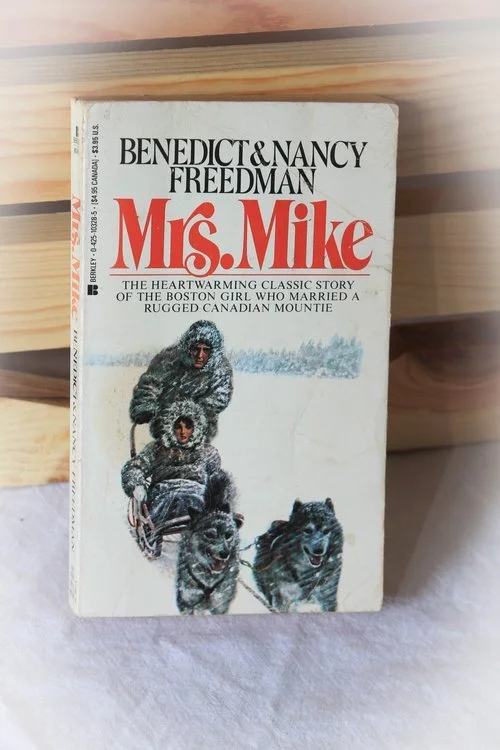Whether you're writing a book, a journal, a blog, or simply a list on a notepad, taking the time to write can be a powerful way to promote self-reflection, mindfulness, and personal growth. Writing reduces stress, boosts your mood, improves mental clarity, strengthens your relationships, and enhances creativity.
Reading Recommendation: Mrs. Mike
Today's book review: Mrs. Mike, by Benedict and Nancy Freedman
This book taught me everything about making someone's (true) story accessible to readers. Katherine and Mike were sympathetic, enjoyable characters, for sure, but they were terrific guides into the world of wild Canada, somewhere I had certainly never been. The minor characters are even more enjoyable. Reading this book teaches you about so much, but it is written in such a beautiful way that you feel like it was a story made up just for you.
How's your day going, writer?
You just never know where your “big break” will come from as an author. Maybe it will be a book review, maybe it will be a chance encounter with a literary agent, maybe it will be a phone call made on your behalf. Who knows? The secret is to not depend on that big break, but rather to focus on doing the legwork to get yourself there.
What's the Secret to Growing a Business? Write a Book!
As a business owner you should be consistently evolving, staying relevant and finding new ways to grow your business, image and brand. There are plenty of “quick fixes” that can be accomplished, giving your profits a temporary boost, but don’t you want to do something that will have a lasting impact on you and your business? It’s time to write a book.
Reading Recommendation: The Bookish Life of Nina Hill by Abby Waxman
Reading Recommendation: The Maid by Nita Prose
A reading recommendation for authors and readers alike - The Maid is a mystery (the eponymous maid discovers a body at a swish hotel and soon finds herself in the frame for it), but the puzzle feels like the least important part of the story. Molly is such a compelling character, and the writing is just so good, that the whodunnit almost feels like an afterthought. I even found myself bawling multiple times while reading.
I'm going to be honest with you
When we are setting goals, we need to be realistic. That doesn't mean we can't "dream big" - that just means we need to be aware of our limits and figure out the steps we CAN take it order to make these dreams come true.
You want to write a book, but you probably can't write for eight hours a day - so maybe you set the goal for 20 minutes a day instead.
And if you miss a day once in a while, is it the end of the world? No.
The important thing to remember is that you need to stay focused, and stay accountable, but also be kind to yourself. The more we beat ourselves up, the less likely we are to keep moving forward with our goals, and the more likely we are to just give up and deem ourselves failures.
A Christmas gift for yourself
“Thank you, Megan. I found a less expensive editor.”
Well, ho, ho, ho.
Receiving messages like this never feels good, and even after going on 20 years in the business, it does still feel like a kick in the pants from time to time.
The sad thing about choosing your rates is that no matter what number you choose, there will be people who come along and tell you that you are too expensive. Basically, they want you to do the work for free, out of the kindness of your heart (though more likely it would be out of their ego).
Are there situations in which people have legitimate financial concerns that prevent them from spending money on non-emergency services? Absolutely.
Would I want to have someone give me their last dime and be evicted from their apartment. Of course not.
But what I see a lot, and what truly breaks my heart, is that authors will talk about their writing dreams…and then do nothing about them.
If you’ve followed me on social media at all you’ll have seen the countless mantras that I have posted that encourage authors to see themselves as necessary, creative beings, and worthy contenders in the world of publishing. There is no better time to write that first word, or that last word.
But what happens after a book has been written? Or what if major writing blocks keep an author from moving forward on their journey? What happens then?
Two things happen – authors either a) struggle indefinitely or b) invest in themselves.
By “invest” I do not mean purchase business cards or purchase another writing course they won’t have time to complete. I do not mean search for the perfect pen or pencil or notebook.
I mean they invest their time in their writing, and then when they need help they invest their money in the best possible guidance they can receive.
My purpose on this planet is to help authors make their writing great and their publishing dreams come true. That is my very deepest passion.
It is also my job, and unfortunately I can’t buy groceries with hugs and good wishes.
How do I choose my rates? I want to fall into industry standards, of course, but I also base my rates on my aforementioned nearly 20 years of experience, as well as the level of detail I put into my work.
Any editor can look at a manuscript and say, “your main character is under-developed.” But when I say that, I also go on to ask the author questions (“what is your main character’s goal?” “what are they looking for in life?”) and then give suggestions on how to improve (“if Brody is willing to sacrifice everything in order to bring Susan home, we need to establish the stakes in the first third of the book”).
So, this holiday season, I am sure that you have already spent a ton of cash on things for other people – toys aren’t getting any cheaper! But what did you get for yourself?
Just imagine what 2023 could look like if you knew that your book could finally become a real, tangible thing.
Just imagine how could it would feel to stop getting lost in the questions and the what-ifs, and have someone actually guide you through the process, kicking the roadblocks out of your way.
I’d love to talk to you about your book project, and how I can help you get that book into the readers, hungry for your words.
Hop on over to the Services page on the website, or simply respond to this email and we can see how to find a way for me to give you the assistance you need.
Give yourself (and your book) a gift this holiday season.
As we begin to close out 2022, I wish you the very best!
To you and your book!
Introducing the Author’s Roadmap, a boutique service offered to authors who are ready, really ready, to realize their long-held dreams of being published.
First we’ll begin with a 60-minute call in which we’ll get to know one another. You tell me about you and your book and what your big, audacious dreams are for getting it published (and even after that). You ask me whatever questions you have and together we identify which roadblocks are keeping you from getting to your last stop.
After we meet, you’ll send me your manuscript and I’ll dive deep within it, identifying which aspects will be most attractive to publishers, literary agents, and readers – and which might need a little work (and then I’ll tell you how to fix them).
Finally, I’ll give you the steps you will need to take to get your book published, and beloved by readers everywhere. Looking for a literary agent? I’ll tell you how to get there. Self-publishing? I’ll get you there, too.
It can be hard to know which way to go, and the options can feel overwhelming.
I’m here to get you where you need to be: published.
(Writing) Trivial Pursuit
I thought we’d have a little fun today and explore some writing trivia. I found some wonderful sites with some great facts, and wanted to share some of those with you:
1. John Steinbeck used 300 pencils to write East of Eden and was known to use up to 60 pencils in a day.
2. The word “colygraphia” means “writer’s block.”
3. Gertrude Stein claimed the water-drinking patterns of her dog, Basket, taught her the difference between sentences and paragraphs in writing.
4. Graham Greene would write 500 words a day and then stop – even in the middle of a sentence.
5. Agatha Christie suffered from dysgraphia, which meant she could not write legibly; as a result, she dictated all of her novels.
6. When Dr. Seuss was stuck writing his books, he would go to a secret closet filled with hundreds of hats and wear them till the words came.
7. In the 1891 UK census, 6,000 respondents identified themselves as writers, editors, or journalists; by 1901, the figure had risen to 11,000.
8. Introverts make the best writers. There is a stereotype that writers are lonely, maladjusted introverts who don’t enjoy interacting with other people. While this stereotype isn’t completely true, studies have found that introverts are more creative and thus better creative writers. One of the reasons for this is likely that introversion gives someone more time to think alone, and thinking alone helps to spark creativity.
9. Creative writing is similar to professional athletics. A German researcher, Martin Lotze, studied the brains of both professional athletes and professional writers and found that their brain activity was very similar during athletic competition and the writing process. Interestingly, Lotze found that professional writers and amateur writers had a key difference: Professional writers used their speech-processing center of the brain to develop their stories, while amateur writers relied on their vision centers to imagine the story first.
10. Our language is constantly changing. The English language changes at an astonishing rate. By one estimate, a new word is added to the dictionary every two hours. The conventions for how to use words also change at regular intervals. For example, some of the leading style guides, such as Chicago, APA, MLA, and AP change their rules for how to use punctuation, pronouns, and specific words and phrases at regular intervals. Writers need to keep up with the latest style changes to ensure their writing meets the mark.
The Author Power Pack: 4 Mini-Trainings to Make Your Writing Dreams Happen and Get Your Book Published Now
Discover Industry Insider Tips and Tricks to FINALLY Write and Publish The Book You’ve Been Talking About Forever
I’m sharing:
• Why you need a nonfiction book proposal, how to write one, and how to make yours stand out from the hundreds of others agents and editors see every day
• The 16 common mistakes and missteps that even the best authors make when writing, editing, and pitching their manuscripts
• The #1 mistake that most authors are making (without even realizing it!) and how you can fix it so you can finally get your book written and published
• The 12 specific strategies my clients use to build their platforms
• The secrets to creating a stellar “elevator pitch” and becoming a pro at pitching yourself
Click the link below to purchase your game-changing Author Power Pack Today!
Everything I need to know about writing…I learned from Audrey Hepburn?
Audrey Hepburn is one of the most famous actresses of all time. Her presence on the screen is unforgettable, and she seemed to move through the world as a sort of luminous being.
She had a pretty tragic childhood (thanks, World War II), and plenty of heartbreak throughout her life, but for all intents and purposes seemed to never lose her vivacity, and her passion for absorbing life and leaving a terrific legacy behind.
She is an inspiration just as a human being, but of course as a creative person who had many gifts that touched people all over the world.
When you’re struggling with your writing, or life, perhaps let yourself hear Audrey’s voice, and let her words permeate:
“Nothing is impossible; the word itself says ‘I’m possible!’”
Believe in yourself – you must do that before asking anyone else to do so, too. You CAN become an author. You CAN write a book. There are no limits.
“Paris is always a good idea.”
If you’re feeling stuck, get out. Is there a place you can go where you can feel relaxed or recharged? Is there a local garden that delights you with its beauty? Do you feel inspired walking about your local bookstore?
“I believe in being strong when everything seems to be going wrong.”
Even the luckiest of authors still face roadblocks along the way – rejection letters, a lack of confidence, etc. But it’s so important to keep moving forward. There IS light at the end of the tunnel – your day will come.
"Good things aren’t supposed to just fall into your lap. God is very generous, but He expects you to do your part first."
You can’t become a bestselling author without a book. You can’t make readers’ hearts swell if they have nothing to read.
“Remember, if you ever need a helping hand, it’s at the end of your arm. As you get older, remember you have another hand: The first is to help yourself, the second is to help others.”
Books have the power to change lives. If you have something to share with the world, it is your goal to share it – whether you’re educating, entertaining, comforting, and/or inspiring.
I believe in you!
The Author Power Pack: 4 Mini-Trainings to Make Your Writing Dreams Happen and Get Your Book Published Now
Discover Industry Insider Tips and Tricks to FINALLY Write and Publish The Book You’ve Been Talking About Forever
I’m sharing:
• Why you need a nonfiction book proposal, how to write one, and how to make yours stand out from the hundreds of others agents and editors see every day
• The 16 common mistakes and missteps that even the best authors make when writing, editing, and pitching their manuscripts
• The #1 mistake that most authors are making (without even realizing it!) and how you can fix it so you can finally get your book written and published
• The 12 specific strategies my clients use to build their platforms
• The secrets to creating a stellar “elevator pitch” and becoming a pro at pitching yourself
Click the link below to purchase your game-changing Author Power Pack Today!











